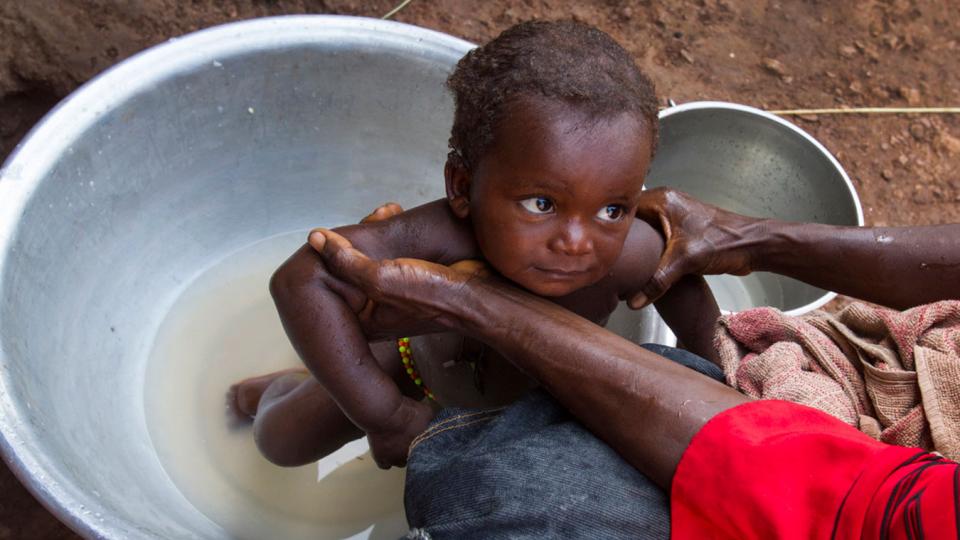Rotary helps Ghana surpass clean water goals

A mother in a community near Sunyani, Ghana, bathes her child with clean water drawn from a local well and stored in a 50-gallon barrel in the family’s yard. The water is also used for drinking, cooking, laundry, and other needs.
Photo Credit: Rotary Images/Alyce Henson
For over 20 years, Michael Anyekase has crisscrossed Ghana drilling boreholes and installing hand pumps on wells to provide clean water. Water for drinking, washing, and flushing toilets.
"There is nothing more satisfying than when fresh water comes out of the well and the children shout, 'Hey, water! Water!'" says Anyekase, who works for Water in Africa, a nongovernmental organization (NGO).
In partnership with Rotary members from across the globe, Anyekase's dedication has helped eradicate Guinea worm disease and lessen the cases of dysentery, diarrhea, and other common diseases associated with dirty water. In fact, Rotary has provided more sources of drinking water in Ghana than any other NGO, Anyekase says.
Many water projects in Ghana are being carried out as part of the Rotary International/USAID H2O Collaboration. The effort is providing more than 100 villages with clean water through installation of boreholes with hand pumps, along with sanitation facilities and hygiene training.
According to a review of the partnership by Aguaconsult, an independent contractor, more than 85 percent of Ghanaians now have access to clean water, surpassing the United Nations Millennium Development Goal of 78 percent by 2015.
Water cures, educates
Samuel Obour, assistant governor of District 9102 and a member of the Sunyani Central club, has spearheaded several water projects. Last year, Sunyani and Canadian Rotary members installed latrines at a primary school in Sunyani and a washing station and toilets at a busy rural market, with funding from a global grant.
"We have so many people traveling from villages to the market. There was no [sanitation] facility of convenience," says Obour. Market-goers would eliminate outdoors and feces entered the water supply, he says, causing dysentery and diseases like Buruli ulcer. If caught early, this flesh-eating disease can usually be treated with antibiotics. But if left untreated, the disease causes irreversible deformity and sometimes life-threatening secondary infections. Obour and other Rotary members have worked with the Ghanaian health service to educate villagers about the importance of early detection and to supply hospitals with necessary treatment tools.
"People who thought Buruli ulcer is caused by spirits will now come to understand that they need to go to hospital for identification," says Obour.
Access to clean water brings benefits even beyond better health, including boosting children's chances of receiving a good education, or any education for that matter.
"Children wake up very early, sometimes 4 a.m., to go miles away to fetch water," says Obour. "Without water, children are not able to attend school [or] some have to go to school late." With water nearby, the burden is lifted. Children can spend more time being children. Families can spend more time being families. And life can take on a new kind of normalcy. An accomplishment that can only be achieved with a team of dedicated resources.
"Meeting the UN Millennium Development Goals is something that no organization can achieve on its own -- not even Rotary, with its 34,000 clubs and over 1.2 million members," says Ron Denham, a member of the USAID Steering Committee and the Rotary Club of Toronto Eglinton, Ontario, Canada. "To be successful, we need leverage -- the leverage that comes from collaboration with others who share our goals. The most notable example of this is the international H2O collaboration."
By Dan Nixon and Vanessa Glavinskas
Rotary News